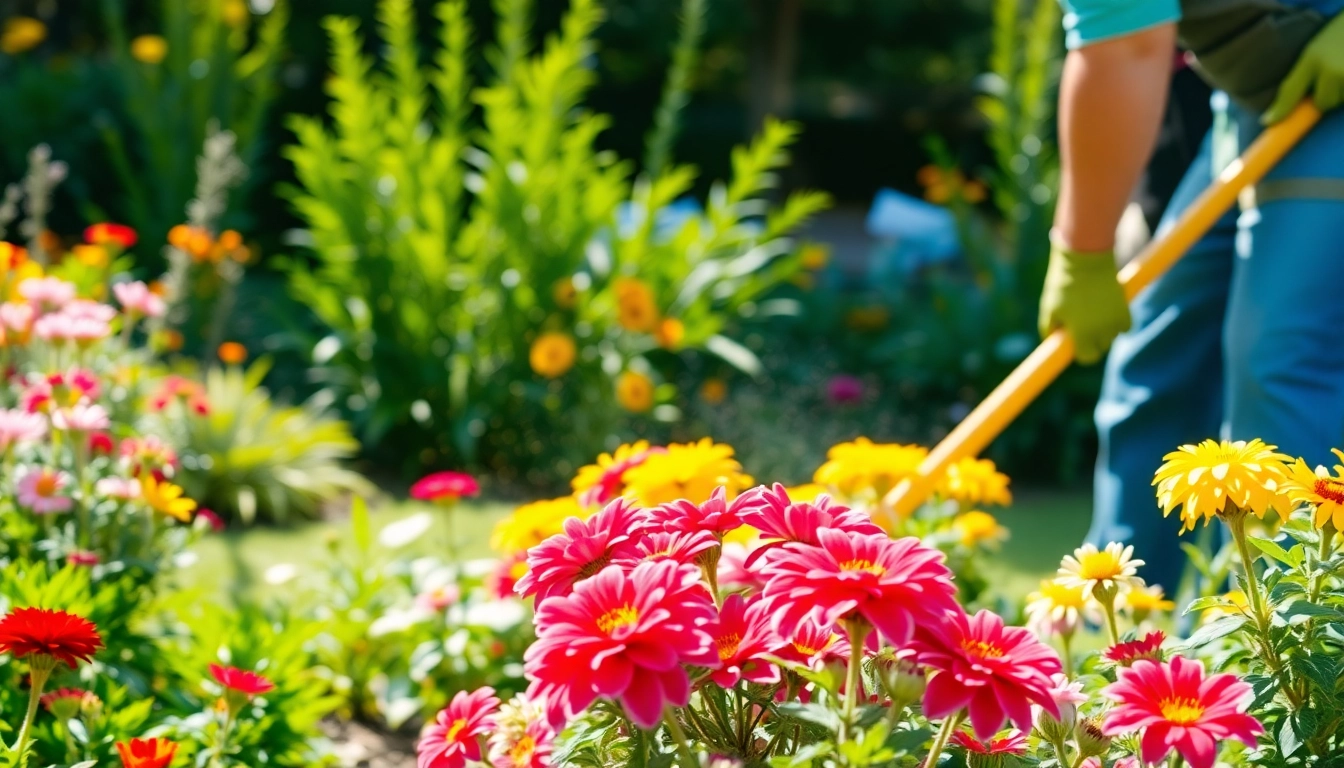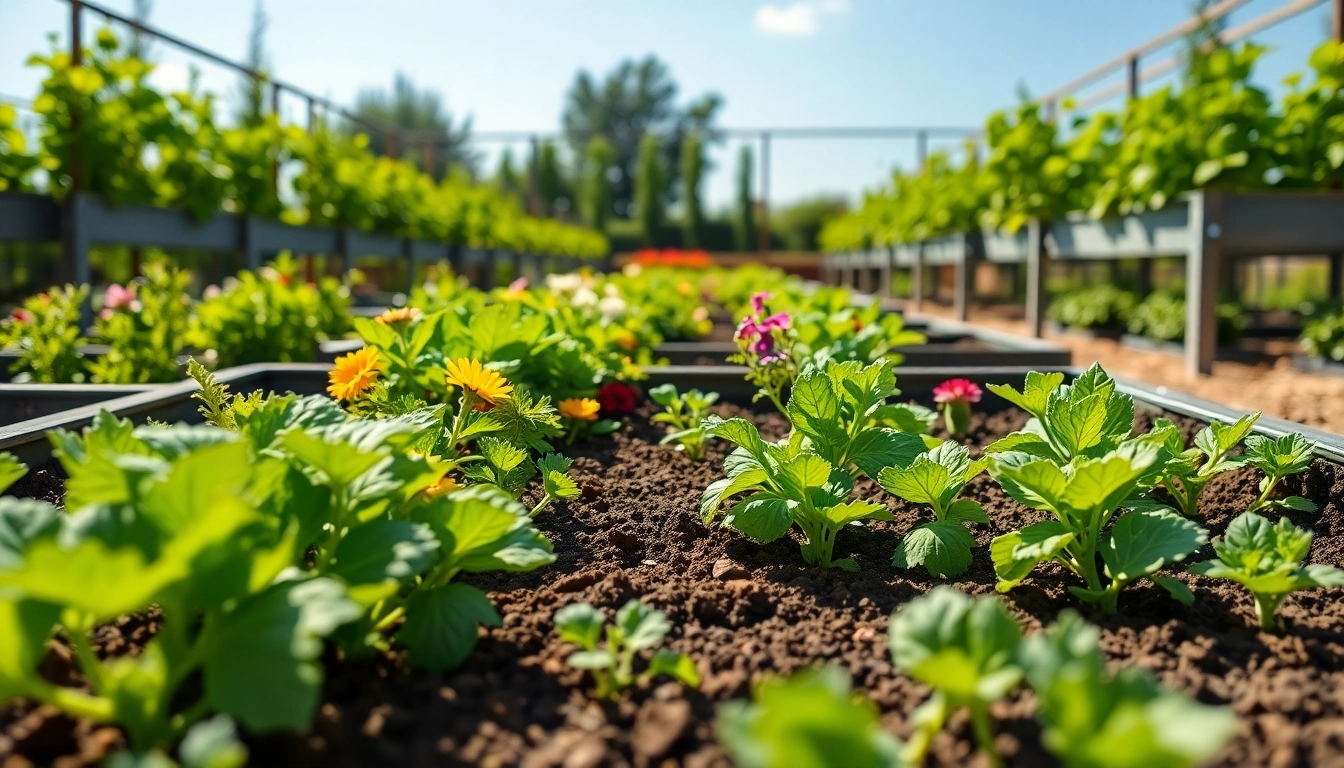Understanding Garden Maintenance Service
What Is Garden Maintenance?
Garden maintenance refers to the ongoing care and management of gardens, yards, and outdoor spaces to promote healthy plant growth and enhance the overall aesthetic appeal of a property. This can encompass a range of tasks including mowing, pruning, planting, weeding, and general upkeep to ensure that gardens remain vibrant and attractive year-round. Whether it’s residential landscaping or commercial greenery, a comprehensive garden maintenance service will tailor its offerings to the specific needs of the client.
Importance of Regular Garden Care
The significance of regular garden maintenance cannot be overstated. Consistent care not only fosters a lush and inviting environment but also helps to prevent potential issues before they escalate. For example, regular weeding reduces competition for nutrients and space among plants, while scheduled pruning promotes air circulation and light exposure, essential for plant vitality. Additionally, healthy landscapes can contribute to biodiversity, making gardens crucial for local ecosystems.
Common Types of Garden Maintenance Services
There is a diverse range of services offered under the umbrella of garden maintenance, each designed to meet different needs. Some of the common types of services include:
- Lawn Care: Regular mowing, fertilization, and weed control to keep lawns healthy and lush.
- Plant Care: This includes watering, fertilization, pruning, and disease management for flowers, shrubs, and trees.
- Landscape Design: Planning and creating new garden layouts to improve aesthetics or functionality.
- Irrigation Systems: Installation and maintenance of systems to ensure efficient watering of plants and lawns.
- Seasonal Cleanup: Removing debris, leaves, and preparing gardens for new seasons or specific planting cycles.
Key Benefits of Professional Garden Maintenance
Enhancing Aesthetic Appeal
A well-maintained garden can significantly enhance the visual appeal of a property. Professional garden maintenance teams possess the expertise to design and execute aesthetically pleasing landscapes. They understand plant choices, seasonal blooms, and design principles that create harmony in outdoor spaces. Regular upkeep ensures that gardens look their best throughout the year, which can be especially important for homeowners looking to impress guests or for businesses wanting to create a welcoming environment.
Boosting Property Value
Investment in garden maintenance services can yield substantial returns in terms of property value. A beautifully landscaped garden can increase the marketability of a home, providing curb appeal that attracts potential buyers. Moreover, well-maintained commercial properties tend to attract more clients and customers. Studies suggest that properties with established gardens may sell for up to 20% more than similar properties without adequate landscaping.
Healthier Plants and Ecosystem
Professional garden maintenance not only supports the health of individual plants but also promotes a balanced ecosystem. Specialized services focus on organic pest control, soil health, and biodiversity, ensuring that gardens are resilient against diseases and pests. Professionals can identify early signs of plant distress and implement corrective measures more effectively than the average homeowner, resulting in a more sustainable and thriving garden environment.
Choosing the Right Garden Maintenance Service
Evaluating Your Needs
Before selecting a garden maintenance service, it’s crucial to evaluate your specific needs and expectations. Consider what type of garden you have, the level of care required, and your personal preferences regarding maintenance frequency. Additionally, think about whether you prefer organic practices, specific landscaping styles, or particular services such as hardscaping or irrigation. Understanding your needs will help narrow down potential providers.
Questions to Ask Potential Services
When interviewing potential garden maintenance services, asking the right questions can lead to informed decisions. Some inquiries might include:
- What services are included in your maintenance package?
- Do you have experience with my specific types of plants and landscape designs?
- How do you handle pest and disease issues?
- What licensing or insurance do you carry?
- Can you provide references from past clients?
Reading Reviews and Ratings
Online reviews and ratings offer valuable insights into a garden maintenance service’s reputation. Look for feedback on platforms like Google, Yelp, or industry-specific review sites. Positive reviews can indicate reliability and quality work, while negative feedback may highlight potential issues with service quality or customer satisfaction. Don’t hesitate to contact past clients for first-hand accounts of their experiences.
DIY vs. Professional Garden Maintenance
When to Hire a Service
While some homeowners enjoy maintaining their own gardens, there are situations where hiring professionals makes sense. Consider enlisting a garden maintenance service when:
- You lack the time or physical ability to manage garden upkeep.
- Your garden has specific needs that require specialized knowledge.
- You want to enhance the aesthetic appeal of your space beyond your current capabilities.
- Health and safety concerns prevent you from using certain tools or chemicals.
Tools and Techniques for DIY Maintenance
For those who prefer to engage in DIY garden maintenance, investing in the right tools and techniques is essential. Key tools include:
- Hand Tools: Trowels, pruners, and shovels for planting and maintenance tasks.
- Lawn Equipment: Mowers, trimmers, and blowers for yard care.
- Fertilizers and Soil Amenders: To support plant health, utilizing compost and organic fertilizers can prove beneficial.
Learning proper techniques also helps in ensuring effective maintenance. Online resources, workshops, or community classes can provide valuable information.
Cost Comparisons and Budgeting
When comparing costs between DIY maintenance and hiring professional services, consider both time and money. While DIY may seem cost-effective initially, the time investment and potential for plant failure can equate to higher costs in the long run. Professional services usually charge based on the specific tasks required but can offer packaged deals that provide long-term value. Establishing a budget based on your needs will ensure you make informed financial decisions.
Measuring the Success of Your Garden Maintenance Service
Setting Garden Maintenance Goals
To gauge the effectiveness of your garden maintenance efforts, set clear goals from the onset. These could range from achieving specific plant growth, reducing the need for pesticides, or creating a seasonal bloom display. Setting measurable outcomes helps track progress and adjust practices accordingly.
Monitoring Growth and Health of Plants
Regularly inspect your plants to monitor their health. Look for signs of distress such as yellowing leaves, wilting, or stunted growth. Keeping a garden journal can assist in tracking growth patterns and identifying issues early. Additionally, utilizing soil testing services can help gauge nutrient availability and inform care strategies.
Adjusting Maintenance Practices
Maintain flexibility in your maintenance strategies as climates and plant needs change over time. Reassess your practices based on observed plant health, seasonal changes, and external factors such as climate. Engaging with professionals for periodic assessments can also provide insight into necessary adjustments moving forward.















Leave a Reply